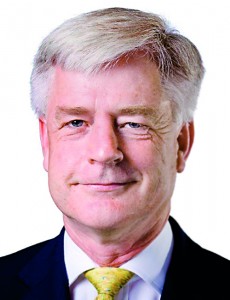Disabled most marginalised in commonwealth – CTO Sec Gen
View(s):The most marginalised group amongst Commonwealth countries comprises people with disabilities, even more so than women, according to Prof. Tim Unwin, the Secretary General of the Commonwealth Telecommunications Organisation (CTO). He also added that vulnerable groups had to receive special attention in terms of ICT adoption because otherwise, as economic growth accelerated, they were often left further and further behind because it was wrongly assumed that they could not contribute, resulting in limited resources being invested elsewhere.

Prof. Tim Unwin
Speaking to the Business Times on the sidelines of the recently concluded 32nd National Information Technology Conference (NITC), where he was the keynote speaker, Prof. Unwin also commented that, aside from people with disabilities, another group that the CTO was focusing on was youth, particularly those that were uneducated or seen as being involved in criminal activities. With ICT skills, these groups could create successful entrepreneurial ventures.
Prof. Unwin also cautioned that communities must create technological solutions with the marginalised in mind or the inequalities would get even bigger, also becoming a threat to the political, social and economic order, which could even lead to violent resolution.
With regard to Sri Lanka, he highlighted the country’s positive ICT literacy progress, which the government had most recently pegged at 50 per cent, while indicating that its overall goal of 75 per cent ICT literacy by 2016, a further 25 per cent increase in just two years, was challenging.
Commenting on telecentres, an area in which Sri Lanka was recently recognised for its progress by the Bill and Melinda Gates Foundation, Prof. Unwin also noted that there was some controversy as to the long-term usefulness of telecentres. For example, could this model be sustained without government subsidies. However, he added that Sri Lanka had shown the potential of telecentres in enabling connectivity and delivering services, particularly in more rural areas.
Further, he also noted that he liked the idea that, in Sri Lanka, civil society groups were being involved in this area, for example with temples hosting telecentres. This, he argued, was a better model than the old notion of public private partnerships, which were fundamentally flawed, with most failing.
At the same time, Prof. Unwin also opined that telecentres could prove to be a good transitional option for improving technical development in rural areas, where people used mostly basic feature phones. So that, when cheaper smart phones, and better and less costly connectivity, were eventually put in place, the lower income segments of the population would not be left out.
Additionally, Prof. Unwin also advocated the use of shared networks, if mass connectivity was to be achieved, instead of situations where resources were wasted by different celcos putting up multiple towers in remote areas instead of sharing towers and extending networks further.
In terms of people with disabilities, he recommended several, proven methods for improvement, including: an organisation championing this cause; a clear policy, which was widely disseminated and understood; making sure people with disabilities did not pay an additional charge, even if the government had to step in and provide a subsidy to stop this; and using the area of government-related procurement to facilitate employing people with disabilities.
(JH)


